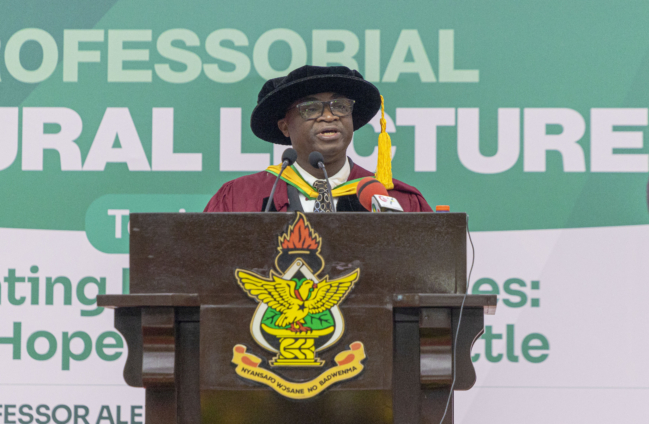KNUST Parasitologist, Professor Alexander Yaw Debrah has emphasized the importance of prioritizing Neglected Tropical Diseases (NTDs) control within national health plans.
Speaking at his professorial inaugural lecture, he stressed that adequate funding should be allocated for NTD control programs, including surveillance, treatment, and research.
"Local and endemic country governments, including the government of Ghana, must commit some percentage of health funds to fight NTDs," he stated.
The lecture, themed "Eliminating filarial diseases: A new hope for an old battle," highlighted how local and collaborative partnerships have led to combating filarial diseases in Ghana. It also covered the development of human and infrastructure capacities to sustain research and control efforts.
While advocating for the inclusion of elephantiasis patients in the National Health Insurance Scheme (NHIS), Prof. Debrah urged the government to allow victims to benefit from the Livelihood Empowerment Against Poverty (LEAP) program.
"LEAP is a social protection intervention of the Government of Ghana aimed at reducing extreme poverty among the poorest and most vulnerable in Ghana. Our research data shows that the little help we gave to the patients actually improved their quality of life. If the government extends LEAP to elephantiasis patients, it will definitely improve their quality of life," he asserted.
Professor Debrah also highlighted the need for regular assessments to ensure the effectiveness of interventions.
"Our experiences from the Yaws Eradication Program and other NTD programs, both local and international, teach us that the last 1% of patients left is as equally important as the first 99% we successfully treated. Therefore, we should be very careful not to close the books on 'eliminated NTDs.' If you are certified to eliminate a disease, it does not mean it is completely eradicated from the country. It means it is no longer a public health threat. However, if care is not taken, recrudescence can set in, and fighting to control it will be very difficult due to factors such as donor apathy and disengagement," he explained.
As digital technology continues to grow, Prof. Debrah called for expanding the use of digital and mobile technologies by community health volunteers (CHVs) to identify new and old cases.
A crucial part of his recommendations is fostering collaboration among policymakers, researchers, academic institutions, international communities, and public-private partnerships to eliminate NTDs.
Latest Stories
-
43-year-old barber discovered dead in Effia-Kwesimintsim shop
3 minutes -
More than 500 galamseyers arrested in the last five months – Government
4 minutes -
Government unveils theme for National Day of Prayer and Thanksgiving
6 minutes -
Stakeholders validate draft of new Fisheries Bill
23 minutes -
Ghana and Malawi strengthen Biodiversity Data Management
23 minutes -
Government should consider youth –led initiatives in climate change issues
23 minutes -
Calls for comprehensive national policy to tackle plastic pollution intensifies
24 minutes -
Mahama receives final report of National Education Forum
24 minutes -
Kofi Adjorlolo discloses he wanted to be a musician, not an actor
31 minutes -
Entrepreneurship is about survival in Africa – McDan
40 minutes -
GRA postpones implementation of GH₵1 fuel levy
48 minutes -
I fast anytime I have a church performance – Jeffrey Nortey
59 minutes -
Build strong character – Sam Jonah tells youth
1 hour -
Ace Ankomah advocates establishment of Independent Natural Resources Commission
1 hour -
Ivorian defender Odilon Kossounou joins All Star Festival 2025 as special guest
1 hour

